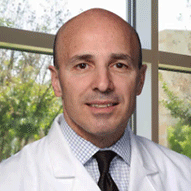
Stephen Xavier Skapek, MD
Pediatric Hematologist/Oncologist
Professor at UT Southwestern Medical Center
Division Director at Children's Health
- Languages Spoken:
- English

Biography
Stephen Skapek, M.D., is the medical director of the Gill Center for Cancer and Blood Disorders at Children’s Health℠ and professor and chief of the Division of Pediatric Hematology/Oncology at UT Southwestern Medical Center.
“I serve as an attending physician, caring for children who have cancer or blood disease admitted to the Children’s Health Dallas and Children’s Health Plano hospitals,” Dr. Skapek explained. “I also devote a substantial amount of time leading a laboratory research program at UT Southwestern; my laboratory research is focused on understanding the drivers of childhood cancer and trying to turn that understanding into better treatments for children with cancer. Finally, as the chief of the Division of Hematology/Oncology and medical director of the Gill Center at Children’s, I oversee all aspects of our clinical practice as well as our educational and research programs in childhood cancer and blood disease. Though it seems, at times, to be a big job, my main priority is to be certain that we are providing the very best care to the children we serve.”
Though it seems, at times, to be a big job, my main priority is to be certain that we are providing the very best care to the children we serve.
After earning his medical degree from Duke University in Durham, N.C., Dr. Skapek completed his pediatrics residency at Wilford Hall Medical Center at Lackland Air Force Base in San Antonio and fellowship training in pediatric hematology/oncology at Dana-Farber Cancer Institute and Boston Children’s Hospital, both of which are teaching affiliates of Harvard Medical School.
Research appealed to Dr. Skapek because of his interest in disease biology and the potential to develop new and better cancer treatments. “In medical school, I had to decide between medical oncology, surgical oncology and pediatric oncology,” he said. “I felt that caring for children with cancer and blood disease brought the potential to have the greatest impact in the lives of the patients under my care.”
Throughout his career, Dr. Skapek has mentored many young clinicians and researchers. “I believe that helping to educate the next generation of doctors who care for children with cancer and blood disease is an important part in the role that I play in this field,” he said.
In addition to his work at Children’s Health and UT Southwestern, Dr. Skapek serves on the Executive Committee and the Scientific Council of the Children’s Oncology Group, the world’s largest organization devoted exclusively to childhood and adolescent cancer research. He is also a member of the Cancer Prevention and Research Institute of Texas’ advisory committee on childhood cancer, and he holds the Distinguished Chair in Pediatric Oncology Research at UT Southwestern.
Education and Training
- Medical School
- Duke University (1988)
- Residency
- Wilford Hall Medical Center/CM (1991), Pediatrics
- Fellowship
- Harvard Medical School (1994), Biological Chem/Molec Pharmacy
Dana-Farber/Boston Children's (1994), Pediatric Hematology/Oncology - Board Certification
- American Board of Pediatrics/Hematology-Oncology
Conditions
Departments and Programs
-
Research Interests
- Elucidating Molecular Mechanisms Controlling CDKN2A Expression During Development and in Cancer
- Understanding Molecular and Genetic Mechanisms Coordinating the Initiation of Differentiation with Cell Proliferation Arrest in Skeletal Myoblasts, and Determining Whether the Manipulation of These Programs Alters the Biology of Rhabdomyosarcoma-derived Cells
- Studying the Molecular Basis by Which Regulated Cyclin D1 Engages p53 to Foster Cell Senescence as a Tumor Suppressor Mechanism
- Defining Actionable Vulnerabilities in Rhabdomyosarcoma and Other Types of Childhood Soft-Tissue Sarcoma
-
Publications
- p18Ink4cand p53 act as tumor suppressors in Cyclin D1-driven primitive neuroectodermal tumor., Saab R, Rodriguez-Galindo C, Matmati K, Rehg J, Baumer SH, Khoury JD, Billups C, Neale G, Helton KJ, Skapek SX. Cancer Research 2009 9 440-8
- Expression of the Arf tumor suppressor gene is controlled by Tgf2 during development, Anderson-Freeman NE, Zheng Y, McCalla-Martin AC, Zheng Y, Treanor LM, Zhao YD, Garfin PM, He TC, Mary MN, Thornton JD, Anderson C, Gibbons M, Saab R, Baumer SH, Cunningham J, and Skapek SX Development 2009 136 2081-2089
- Arf-dependent regulation of PDGF signaling in perivascular cells in the developing eye, Silva RLA, Martin AC, Thornton JD, Rehg JE, Berwistle D, Zindy F, and Skapek SX The EMBO Journal 2005 24 2803-2814
- The Arf tumor suppressor gene promotes hyaloid vascular regression during mouse eye development, McKeller RN, Fowler JL, Cunningham JJ, Warner NW, Smeyne RJ, Zindy F, and Skapek SX Proceedings of the National Academy of Science 2002 99 3848-3853
- Inhibition of myogenic differentiation in proliferating myoblasts by cyclin D1-dependent kinase, Skapek SX, Rhee J, Spicer DB, Lassar AB Science 1995 267 1022-1024
-
Professional Activities
- Pediatric Oncology Group/Children's Oncology Group
- Association for Research in Vision and Ophthalmology
- American Society of Pediatric Hematology/Oncology
- American Association for Cancer Research
-
Awards and Honors
- D Magazine Best Pediatric Specialist 2020-2021
- Distinguished Chair in Pediatric Oncology Research 2013, UT Southwestern
- Distinguished Professorship in Pediatric Oncology Research 2011, UT Southwestern
- Research Scholar Award 2004, American Cancer Society
- Honorable Discharge (Rank: Major) 2001, United States Air Force
- Medical Research Award 1999, G and P Foundation for Cancer Research
- Clinical Investigator Development Award (K08) 1994, NIH
- USAF Achievement Medal 1992, United States Air Force
- Resident Physician of the Quarter 1991, Wilford Hall Medical Center
- Pediatric Research Resident Research Award (Runner-up) 1991, Howard Johnson
- Pediatric Resident Research Award (Finalist) 1990, Howard Johnson
- Alpha Omega Alpha 1988, Duke University
- Summa Cum Laude Graduate 1984, Duke University
- USAF Health Professions Scholarship 1984, United States Air Force
- Commissioned, Second Lieutenant 1984, United States Air Force
- Phi Beta Kappa 1983, Duke University